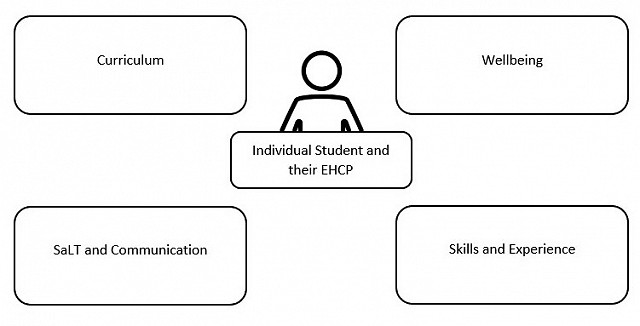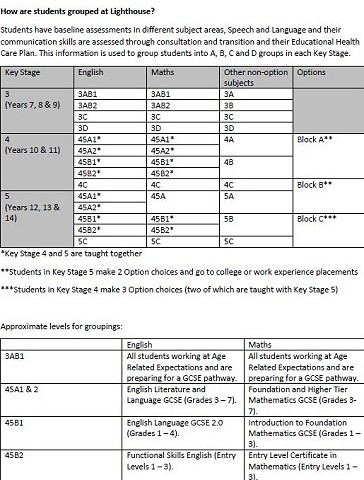The Lighthouse Way
Lighthouse School exists to support young autistic people to have a successful and bright future. We provide an ambitious holistic education – focusing on the individual needs of the student - that challenges our students to be the best they can be.Our Cornerstones
Lighthouse School supports the whole student – their head, their heart, their body, their family, and their future. To do this, we have four areas of the school – our cornerstones - that work symbiotically to help our students:

Teaching Philosophy
Everything in Lighthouse School is built around our students. To do this successfully, an innovative and versatile teaching philosophy is required.
Our practice is research-informed and we have experience of what has worked, but every one of our students is unique. The research and experience provide a toolkit, rather than a blueprint for our practice. We are constantly trying new ways to support our students and we regularly assess the impact this is having.
In short, our teaching philosophy is: whatever works for the individual student.
For one student this may be an individualised learning project to engage them with a subject they have a negative association with, while for another it may be a clear routine-based lesson structure. One group or subject may replicate a typical ‘college’ experience, while another may utilise aspects of primary education. Learning across the school looks different depending on the students and subject. It is through this versatile approach that we are able to support our individual students achieve our ambitious goals for their future.
Our Structure
Lighthouse School is a secondary school, and although a specialist provision, we largely operate under a secondary model. Students move in groups around the school to lessons taught by specialised and highly-skilled staff. This ensures our staff have the subject and curriculum knowledge required to maximise impact on students.
Our teaching groups are small with approximately 11 students in each group. Groups are based on a range of factors, including expressive and receptive language levels. Even with these small groups, there is often a wider academic level range in our lessons than in a mainstream school as our students have ‘spikey profiles’ (significant strengths in one part of the curriculum and difficulties in another aspect). This requires effective differentiation and scaffolding. To support this, we have a high staff-student ratio - on average 1 staff for every 3-4 students. This ensures staff are able to meet the unique needs of each student.
Teaching groups are largely based on communication level and key stages – although there is some fluidity for individual students. The focus for Key Stage 3 is to develop students’ ‘learning to learn’ skills, re-engage them with education, and identify and address gaps in learning. Students then often begin to work towards qualifications in Key Stage 4. This continues in Key Stage 5 with additional preparation for adulthood and work experience opportunities.
Although lessons are delivered by subject-specialists, a golden thread of holistic learning runs throughout the school. We know that, beyond qualifications, the application and generalising of knowledge and skills will be fundamental to our students’ futures. This can be something that some autistic learners struggle with, and therefore this is a focus for our provision. Cross-curricular projects and community-based learning feature heavily in our provision to address this. All staff are trained in wellbeing strategies and speech and language techniques to ensure this is integrated across the provision.

As autistic learners can struggle to generalise learning, we have adopted an immersive approach to Spiritual, Moral, Social and Cultural (SMSC) education. Personal development is embedded across all aspects of the provision as doing so has the most impact on our students. This includes:
Timetabled sessions. Every student (including KS5) has the following sessions on their timetable:
Relationship, Sex and Health Education (RSHE) – the curriculum has been adapted to ensure it is age-appropriate and accessible and covers a range of RHSE topics and British values..
Wellbeing – this utilises a therapeutic approach to develop Emotional Literacy skills.
Future Skills – this develops employability, business and work-place ‘soft’ skills.
Life Skills – this develops self and living skills.
Community Skills – students access the community at least every fortnight – both to develop their safety skills and apply their learning (e.g. money in Maths).
Assemblies – weekly assemblies are utilised to celebrate students’ achievement and discuss important themes (e.g. morality, school and British values).
Interventions.
The vast majority of Lighthouse students will participate in at least one intervention while at the school. These fall under our cornerstone structures:
Wellbeing, emotional health/behaviour interventions. This includes Outreach/Support in the Home, where staff may support the embedding of strategies in the students’ home.
SaLT, additional communication interventions
Academic, e.g. Alpha and Omega/Phonics
Life Skills (e.g. support with personal self-care, money, leisure activities such as local libraries, theatres and cafes)
Extra-curricular activities, including:
SHINE – a regular after-school/holidays club used to develop social interaction skills
School Council
Language Club
Chess Club
Minecraft Club
Enrichment activities.
Recent examples include:
Participating (and winning!) the Leeds Debating Competition
Planning and delivering student enterprise stores in conjunction with other schools (Compass House)
Meaningful employer interactions (e.g. PenTest IT security, Marks and Spencers)
Work experience (e.g. Lotherton Hall)
Visits to cultural centres (e.g. local mosque)
Visits to places of interest (e.g. a working quarry)
Personal development is everyone’s responsibility at Lighthouse and we know it can only be successful with an integrated approach (including working with parents and families).
